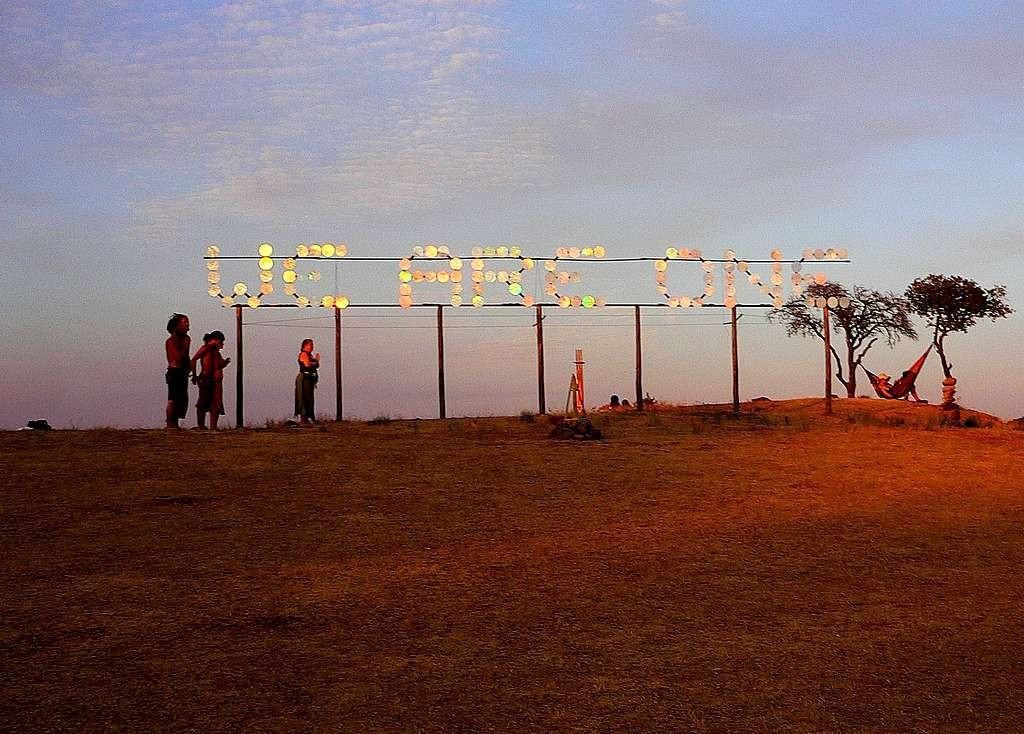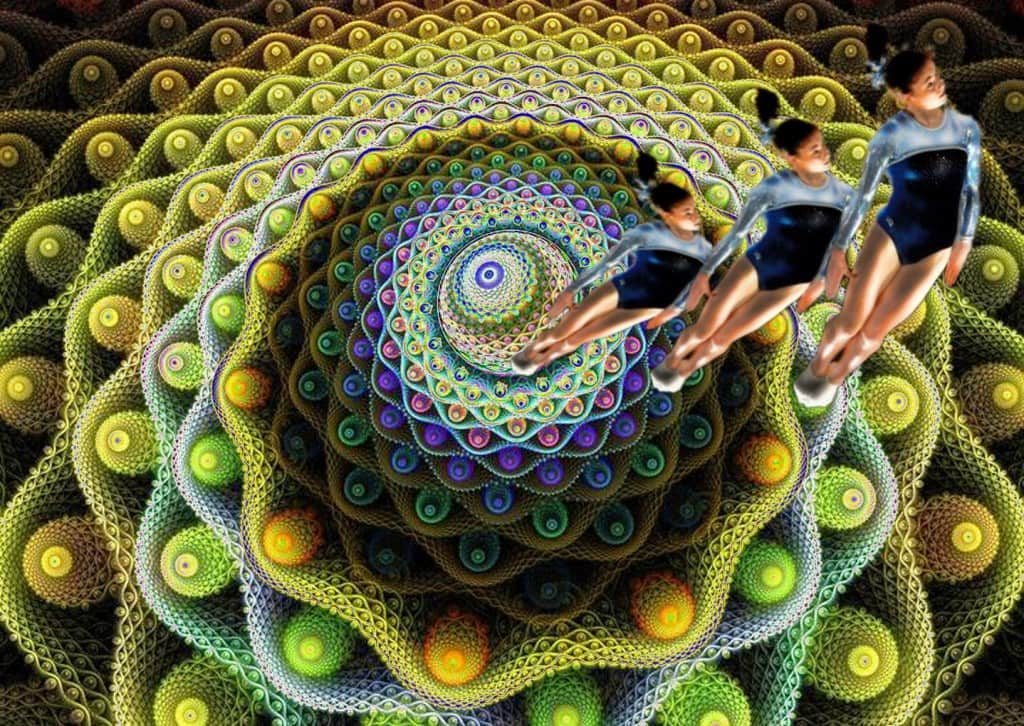Some thirty years ago, in May 1983, Terence McKenna’s contact lenses failed him during a critical moment of his speech at the psychedelic conference in Santa Barbara. Unable to read from the page, McKenna had to resort to improvising. Listening to the recording after the event, he couldn’t help but notice the crowd’s reaction to a certain bit in his improvised talk, when he’d spoken the words ‘psychedelic society’. He had never used the phrase consciously before, but hearing the ripples that went through his listeners when he brought up the concept made McKenna wonder about its possible meanings.
A year later, in a classic June 1984 talk which was given at the Esalen Institute, and later adapted into a chapter in the 1997 psychedelic anthology Entheogens and the Future of Religion, McKenna proposed some of the possible characteristics and implications of such a psychedelic society.[i] A psychedelic society, he suggested, need not be one in which all members ingest psychedelics themselves. Rather, it is a society which orients itself and lives in the light of the irreducible Mystery of Being; a society in which problems and solutions are displaced from their traditional central role, and which puts ‘irreducible Mysteries’ in their stead. Such a society, McKenna suggested, would be less keen to find clear and definitive answers, and more open to exploring reality without imposing simplified structures upon it. It would be more immune to the disastrous urge for simple clear-cut answers and identities, which characterizes human societies, and be more open to co-existing with the doubts and contradictions inherent to the cosmos.
McKenna’s vision of a psychedelic society was closely related to another of his most popular ideas: the idea that culture and ideology are not your friends. According to McKenna, ideology and culture are tools which give other people the power over one’s experience and identity, since they lead individuals to shape their identity according to pre-conceived forms. If you identify yourself with brands or with the popular ideas about what is beautiful, true, right or important, you are giving away the power over your experience to other people. You let others tell you what to think, instead of thinking for yourself.
Not to mistake culture and ideology as your friends meant seeking to understand reality in one’s own terms instead of buying into pre-packaged ideological and cultural deals such as communism, capitalism, democracy or totalitarianism. Psychedelics were the tools that would enable that to happen, for as McKenna repeatedly argued, psychedelics are boundary dissolvers, belief breakers, and deconditioning agents which raise doubts in you whether you are a Hasidic Rabbi or a Marxist anthropologist.[ii] ‘The plants … don’t address cultural values, they blast through them, they address the animal body, the mammalian brain.’[iii] The psychedelic human being was thus to be a person that creates his own culture and ideology. The psychedelic artist was to be the artist whose work is uniquely original, transcending the limits of pre-conceived styles and forms. The psychedelic thinker; the one thinker to think outside the established norms of thinking.
And there was another, even more fundamental, flaw to culture and ideology. Belief in itself, argued McKenna, was limiting to the individual, because every time you believe in something you are automatically precluded from believing its opposite. By believing something, you are virtually shutting yourself from all contradictory information, thus once again performing the sin of imposing a rigid simplified structure upon an infinitely complex reality.[iv] A psychedelic society, McKenna suggested, ‘would abandon belief systems for direct experience.’[v]
Reading the Psychedelic Society many years ago, in a time when I immersed myself in the universe of McKenna’s writings and talks, I was captivated by the idea. Yet, in the years since, my thoughts of the subject have become less certain and unequivocal. Like many of McKenna’s ideas, the concept of the psychedelic society as a society without belief and ideology was a brilliantly articulated and inspiring notion, yet it seemed to have a suspect air of unexamined utopianism. Was it possible to live without culture and ideology? Was a society without certain types of shared beliefs and constructs even conceivable? In this essay, I wish to convey some of my thoughts and reflections on the subject following a recent encounter with a Spanish psytrance tribe.

A genealogy of the psychedelic counter-cultural idea:
McKenna’s notions that culture and ideology are not your friends, and that belief is intrinsically limiting, were closely related to two other key ideas in the history of psychedelic thought: Aldous Huxley’s Mind at Large Theory and Timothy Leary’s idea of Reality Tunnels. Huxley’s Mind at Large Theory, elaborated in the Doors of Perception, suggested that Man’s view of reality is limited by a ‘reducing valve’ which filters out his perception of reality so that it includes only the thinnest trickle of perceptions necessary for his survival. The function of consciousness, Huxley argued, following such thinkers such as French philosopher Henry Bergson and the English epistemologist and philosopher C.D. Broad, was not to channel the myriad impressions perceived by the senses into our awareness, but rather to filter out the staggering noise of details which fills our raw perception. Consciousness was the mechanism which allowed us to edit out of our awareness the sound of birds chirping in the background while we are working to complete an important task; or making us neglect to notice the special way in which light reflects upon the skin of an apricot we are about to consume.
Were we to become engrossed in the many details perceived by the senses, we might become unable to function efficiently, Huxley argued, so consciousness edits out from our experience what it considers inconsequential information. In this way, an infinite world is reduced into our finite and more manageable, but also infinitely poorer and incomplete perception of reality: what we call a worldview.
Same as with McKenna’s culture and ideology, Huxley’s reducing valve was a mechanism which cuts down on the complexity of reality by fitting it into pre-conceived forms which make us more immediately efficient in terms of evolutionary survival, but immensely less open, creative, and aware. And culture was also a type of reducing valve, ‘What we see through the meshes of this [cultural] net is never, of course, the unknowable ‘thing in itself’ […] What we ordinarily take in and respond to is a curious mixture of immediate experience with culturally conditioned symbol.’[vi]
The extraordinary value of psychedelics, Huxley argued, lay in their ability to allow us to loosen this reducing valve of perception and let ourselves behold reality in a fuller, richer way, bringing us closer to the Mind at Large, the ultimate reality of things, and enabling us to revolutionize psychology, spirituality, education and society. Psychedelics were tools for ‘cutting holes in cultural fences […] the most urgent of necessities.’[vii]
About a decade after Huxley suggested his Mind at Large concept, Timothy Leary proposed his own take on the idea: the concept of the Reality Tunnel. Same as Huxley’s reducing valve of perception before and McKenna’s Culture and Ideologyconcepts after, Leary’s reality tunnels, later further elaborated by Robert Anton Wilson in books such as Prometheus Rising,[viii] were a pre-composed pattern which limits and distorts the perception of reality by reducing complexity and options. A person’s reality tunnel would determine their perception of the world, editing out those bits of perception that do not fit their beliefs, while singling-out and enlarging those details which fit well together with the persons’ particular reality tunnel. A capitalist, for example, would avidly gather any fact and piece of information which might support their claim that capitalism is the best economic system, easily forgetting and discarding any piece of information which might contradict that view.
Similarly, a sworn communist would avidly collect any article of information which might support their claim that communism is the best economic system, quickly forgetting and discarding any piece of information which might contradict that view. Reality tunnels were ubiquitous and included ‘Eskimo totemists, Moslem fundamentalists, Roman Catholics, Marxist Leninists, Nazis, Methodist Republicans, Oxford agnostics, Snake worshipers, Ku Kluxers, Mafiosos, Unitarians, IRA-ists, PLO-ists, orthodox Jews, hardshell Baptists etc. etc.’[ix] All of us harbor established ideas about minorities, religions, nationalities, the sexes, the right ways to think, act, feel, govern, eat, drink and what not. Reality tunnels act to help us fortify these ideas against any challenging information.[x]
Like Huxley’s reducing valve, Leary and RAW’s reality tunnels are a physical metaphor (a valve in the case of Huxley; a tunnel in Leary’s case) for mental ‘structures’ which reduce an irreducible reality into the impoverished worldviews Man holds. The two concepts were both highly compatible with McKenna’s Culture and Ideology not being your friends. A subtle difference existed, however, in the main focus of each of these theories, and in the ways in which they were habitually framed. Whereas Huxley’s reducing valve metaphor was mostly concerned with how consciousness edits the impressions of senses into our perception, Leary and RAW’s reality tunnel concept was primarily concerned with how consciousness endlessly works to create ideological constructions and obstruct other possibilities from view. McKenna’s Culture and Ideology argument, in turn, was primarily concerned with the ways in which external constructs imported by consciousness serve to limit not only our worldview but also our identity and our possibility to exist as unique, authentic beings.
Thus, as I have previously shown,[xi] Huxley’s reducing valve, Leary and RAW’s Reality Tunnels, and McKenna’s Culture and Ideology are basically different aspects of one and the same idea – that the structures of the mind serve to limit our perception and experience reality in a disempowering way, and that psychedelics are the antidote which allows us to dissolve these limiting structures and beliefs. If one might speak of psychedelic philosophy as a coherent body of thought, then this would certainly be one of its most basic tenets and features: the ideal of the psychedelic minded individual as a person who perceives and experiences reality in the fullest, richest, most flexible and least-prejudiced way possible, who methodically trains himself to loosen his reducing valve, who is profoundly aware of the limiting power of reality tunnels and ideologies and learns to avoid them or deal with them in conscious, intelligent ways. This idea, which has different variations in the thought of Huxley, Leary, RAW and McKenna can also be found in the work of later psychedelic and countercultural thinkers such as Douglas Rushkoff[xii] and Erik Davis.[xiii]

A society without a culture?
In suggesting the concept of Psychedelic Society McKenna took a psychedelic and countercultural ideal, that of a unique life not given to pre-conceived cultural and ideological structures, and moved it from the personal to the societal level. In the same way that human beings should strive to live as free as possible from pre-given notions and ideas, so should society confront the world in the most creative and open-minded way possible without adhering to cultural structures.
As McKenna was fond of saying, quoting the British entomologist J.B.S Haldane: ‘The universe may not only be stranger than we suppose. It might be stranger than we cansuppose.’[xiv] Our society’s tools for understanding the universe are limited by nature. Every culture in history believed that it got 95% percent of the world figured out, and that the other 5% will soon be in grip, argued McKenna. Modern culture, like so many before it, enjoys gazing back on the ideas of its predecessors with an air of ridicule, congratulating itself on finally getting it right. However, this claim was nonetheless ludicrous and parochial in our time than it was in the time of the pharaohs, and where was it even written ‘that semi-carnivorous monkeys can or should be capable of understanding reality?’[xv]
A psychedelic society, by contrast, would be a society that doesn’t purport to have reality neatly organized by some popular ideology. Rather it would be willing to explore questions and possibilities. Such a society will, moreover, not just abstain from confining itself to one version of reality. Rather it would put the great mystery of being, the paradoxical, unfathomable nature of reality, at its very centre.
Still, there seemed to be inherent dangers to the injection of the idea that culture and ideology are not your friends into the social level. Culture, after all, stands at the basis of human society. It is the thing that emerges in any place where joint human life exists and it is difficult to imagine life without it. If one were to relinquish any form of culture, after all, one would have no art, no music and not even language, for what is language if not shared cultural constructions which inhabit the mind of the individual and shape it into a template which is unique to the culture. Ridding ourselves of ideology was an equally tricky thing to do. How would society function for example if we just stop believing in democracy and human rights? And after all, as one commentator noted, did not the culture and ideology are not your friend meme itself have a underlying thread of individualism, ‘a very western (especially North American) culturally based belief.’[xvi]
It is not possible to throw away all of culture. As McKenna himself pointed out, there are some parts of it we wouldn’t want to discard, like the Sistine chapel, the Rembrandts, the Piero della Francescas and even the scientific method.[xvii] You don’t want to throw out the baby with the bath water, and getting rid of a whole of culture is a highly risky business. McKenna’s point is that you need to spend as much time creating your own culture/ideology with you and your friends as possible, rather than just consuming something created by somebody else. This, however, did not, could not, mean disavowing any type of shared cultural creativity. McKenna himself, after all, was a huge cultural buff, and an avid aficionado of various cultural artifacts such as the writings of James Joyce, Marshall McLuhan, and C.G. Jung, or the esoteric knowledge contained in the I Ching. Despite his tirades against culture, McKenna was an insatiable consumer of myriad forms of culture, which trickled into his thought and informed his ideas and thinking.
You still want to be able to keep at least some of what was good about culture, while editing out those parts of it that were useless and counterproductive. But how is one to accomplish such a task – a question all the more pressing in the absence of any ideology to guide oneself – is something that McKenna, to the best of my knowledge, never really answered.
There existed an inherent tension between the wish to purge humanity of the demons of culture and ideology, and the humble realization that by casting away these two we risk losing the very things that make us human: our ability to inhabit a shared mind-space, indeed the very conditions which allow us to co-exist as a society. McKenna argued that culture and ideology are not you friends, but he never went as far as saying that society is not your friend, even though it was not clear how a society without any ideology or culture would look.

Even though the terms and exact ways in which a psychedelic society would function remained vague, there seemed to be two fundamental ideas that would characterize such a psychedelic society. 1) It would live in the light of the great mystery of being. 2) It would seek to eradicate ideology and diminish the prominence of culture in a way that would allow for greater degrees of openness and creativity, as well as a more unique experience of being.
If there ever existed a society of the sort, then it might very well have been Kesey’s Merry Pranksters. Kesey, after all, was also the prototypical psychedelic leader, a self proclaimed non-navigator whose main function was to inspire and allow those around him to explore and lead themselves.
The direct, immediate and overpowering experience was at the centre of Kesey’s Merry Pranksters, who were more interested in endlessly breaking boundaries than in reaching any final destination. As Kesey later said in an interview quoted in part six of Oroc’s Psychedelic Revolution series to which I will come in the next part,[xviii].
The answer is never the answer. What’s really interesting is the mystery. If you seek the mystery instead of the answer, you’ll always be thinking. I’ve never seen anybody really find the answer, but they think they have. So they stop thinking. But the job is o seek mystery, evoke mystery, plant a garden in which strange plants and mystery bloom.[xix]
However, was it not telling that the Merry Prankster’s free-wheeling and anarchic ride across the United States also left a trail of acid and DMT casualties along the way, as the intrepid group continued it trip furthur and beyond? And even the Pranksters arguably only existed as a truly psychedelic society for that short and adventurous period of time. Perhaps in order to exist as a psychedelic society without any cultural and ideological baggage you need to be in a state of constant revolution? Such a state is one that very few societies, if any, could maintain for a sustained period of time.
Confronting psychedelic culture in the Vega:
In the spring of 2015, after a year in Spain, I arrived to my first Spanish psytrance party. The location of the party was south of Granada, in the hilly area known as the Vega. There had been some 100-200 psychedelic ravers in the event, a small and select gathering of the relatively small Spanish trance tribe, with plenty of old timers as well as dedicated young ravers.
I had arrived to the party after a long period of psychedelic abstinence. The night before, I had read James Oroc’s sixth and final installation in the series on what he calls the second psychedelic revolution (defined as the psychedelic movement that reemerged ever since the 1990s).[xx] The ultimate chapter of this engaging series had been the most compelling and inspiring answer to the question of why psychedelics matter that I have encountered since McKenna’s Psychedelic Society. Oroc suggested that in an ego-obsessed society wildly and blindingly driving itself to its own mutually assured destruction, the rediscovery of the transpersonal experience and the interconnectedness of all things, and the breaking down of the disastrous somnambulism of technological civilization, is humanity’s only chance for survival. The psychedelic perspective was the one required for humanity’s adaptation and survival, the antidote for humanity’s current position of aimlessness, blindness and general numbness.
The second psychedelic revolution, Oroc claims, was actually part of a fifth cycle in a history of psychedelic cultures. This fifth psychedelic culture, the modern psychedelic culture whose roots can be found already in the discovery of mescaline at the end of the 19th century, followed four major sustained psychedelic cultures in history, which included Ancient Greece with its Eleusinian mysteries; Vedic India and its soma; Mexico’s Toltec, Mayan and Aztec cultures; and the ancient Chavin civilization of Peru.
Oroc’s bleak portrayal of the state of human civilization contrasted strongly with his view of this fifth psychedelic culture, which he described as exceptionally intelligent, tolerant and open-minded. A society with incredible creative resources, which is in the process of breaking out of the festival model in order to build permanent communities of responsible psychedelic users. ‘Responsible psychedelic use can build community,’ Oroc insisted[xxi] – yet another reason why psychedelics are so crucial too our culture.
And still, at the same time, Oroc seemed aware of the many pitfalls psychedelic culture is in risk of falling into, acknowledging a ‘growing move towards hedonism, escapism and a flirtation with the fantastic’, and confessing that even he was despairing at times ‘that the message is being lost in all the beautiful pictures and the pretty lights.’[xxii]
Arriving to the Vega psytrance party that weekend confronted me with the living reality of a psychedelic society in action – what it was what it wasn’t. Of course, one could not surmise that this specific event I half-randomly arrived to was representative in any way of the whole of psychedelic culture, yet somehow, by the virtue of its generic character, it actually did seem to represent much about the current state of psychedelics in culture and society.
Observing the event as an outsider to the scene, I could sense the community and its spirit – a manifestation of a society centred on the psychedelic experience. Psychedelic society, after all, was not only a theoretical concept discussed in Californian psychedelic conferences. It was also an actual way of life that emerges in various environments and conditions.

Encouragingly, psychedelic culture has been growing steadily in the past decades, supporting a growing stream of psychedelic books, music, movies and festivals, and arguably driving and inspiring more informed psychonauts than ever before to embark on their own personal voyages. Concomitantly, some of the less savory parts of the enmeshing of psychedelics within a globalized consumerist culture have also been becoming more and more evident in psychedelic culture. Many of them were to behold on the fiesta. This culture was fraught with escapist hedonism and excessive drug use, which seemed to trivialize and drain the psychedelic experience of its many qualities and possibilities. Many of these party people seemed to be running away from themselves as frantically as any of their counterparts in the mainstream culture – psychedelics, like any tool, I was reminded, could also be used to avoid yourself, instead of to reconnect. Furthermore, it had deeply chauvinist tendencies, meaning that it was centred around itself and believed itself superior to other sections of society; and finally, and perhaps most significantly for this discussion, it was closed off within a cultural discourse which was as formulistic and dogmatic as any other.
Observing the culture that emerged in these few days on the hilly terrain of the Vega, a culture arguably characteristic of much of the global psytrance scene, allowed one to notice the norms and rules established within the community. This culture had formed ossified structures like all others before it: certain ways of dressing, behaving, talking and thinking. In a way this societal laboratory almost seemed like the burial place for McKenna’s idea of a psychedelic society as a society without limiting cultural structures and beliefs. These Spanish psychonauts embraced what seemed like a ready-made psytrance identity without giving it a second thought, undermining McKenna’s idea of carving our own individual existence instead of letting culture dictate our values and ideas to us.
Watching the mundane and trivialized manifestations of a psychedelic society in which the psychedelic experience is trivialized and arranged into ready-made cultural forms suddenly caused me to question the actual transformational potential and import of these agents for our society. In the mid twentieth century, psychedelic psychiatrists such as Humphry Osmond and Donald Jackson were spreading the idea that psychedelics were a tool which might allow humanity to confront and resolve its deepest maladies and challenges, from the existential malaise troubling the western world to the threat of a nuclear war.[xxiii] Since then, psychedelics have been amply used, abused and increasingly assimilated into a consumerist culture. Observing the ways in which psychedelics were used and abused on the Vega, I could not help but ask myself whether psychedelics have not lost some of their revolutionary and transformative power in the decades that have past. Have they not turned into just another manageable but meaningless form of amusement, too weak and negligible to pose any threat to the established forms of power and control?
Judging by the way it has fallen into foreseeable forms and structures, this might have been the case. In many ways this psychedelic culture was non the more liberated than any other branch or sub-culture in modern civilization. It too was organized around basic themes, styles and ideas, which eventually limited the spectrum of possibilities, of what it could mean to be psychedelic and to have a psychedelic experience. This almost foreseeable situation seemed pretty much determined by human nature, by the human need to belong and by the human tendency to unconsciously seek acceptance and imitate those around us. It is instructing to remember that none of the four psychedelic cultures that Oroc surveys in his piece could refrain completely from erecting their own reality tunnels. As far as we can tell, each of them had its mythologies and cultural structures. Our own psychedelic culture is no different, and perhaps one should not expect otherwise. Human rights and environmentalism are also forms of ideology. It might be useful to know that they too are incomplete, but do we really want to discard them completely?
At the same time, psychedelic culture did allow more freedom to explore than any other culture I know, and was potentially more tolerant and welcoming to those who decided to explore and depart from the established norms. Although most people chose to carve their psytrance identity within established forms and norms, there was also a possibility to create your own unique identity. Moreover, the psychedelic experience, by merit of its highly personal and subjective character, which differs from person to person and from one occasion to another, still fostered a highly personalized experience that allowed each individual to have a unique experience of the festival. In other words, this society was not perfect, and it was still liable to assume borrowed cultural forms and norms, and yet it also allowed its members a higher degree of freedom and incentive to explore their truly personal and unique perspectives of the cosmos.
And there was another, more fundamental way in which this group of people demonstrated the superior transformative power that psychedelics could hold for society and the individual. This aspect was related to the first part of McKenna’s definition of the psychedelic society. McKenna envisioned psychedelic society as a society existing in the light of the great mystery of being, of a connection to something that is grand and unfathomable. And that, ultimately, was the thing that drew all these people together – the fact that they had all shared the overpowering experience of connection to something greater and beyond; that any two people who were truly part of this culture had shared the same experience of confronting something mythical, great and beyond expression. It was the relationship to this something, found in the experience of psychedelic trance, which bound all these people together. And here was McKenna’s psychedelic society, by definition. It was not perfect. It had many failings and shortcomings but it centred itself around the greater mystery, it was tolerant, and it was organized around a uniting experience and ideal of love. And that, finally, answered my questions regarding the possible import of psychedelics after decades of abuse and trivialization of the psychedelic experience.
Despite these long decades of widespread trivialization, the power of this medicine to raise people’s degree of openness and tolerance towards the other, to refocus their life away from materialistic desires and to raise communal and environmental awareness, was still the best bet humanity had to build a better, more sustainable world. This random and temporary psychedelic society erected in the Vega for the weekend was not perfect, and the psychedelic society to come won’t be perfect either. It will undoubtedly still harbor many of the diseases and sicknesses of our present close to terminally-ill society. Ridding ourselves of those is a hard and challenging work, as any serious psychonaut knows. All the more so when viewing the problems of humanity on the collective level. And yet, this experience was our best bet for a saner, healthier future for humanity.

Conclusion:
My experience in the Vega led me to ponder about that seemingly failed aspect of McKenna’s vision of a psychedelic society: the fact that psychedelic society tends to assume pre-defined and particular forms of culture, which in their turn come to limit it and prevent it from being something else, more formless and free. In this way psychedelic philosophy has become limiting for psychedelic thinking, psychedelic visual forms have become limiting for psychedelic aesthetic, and psychedelic sounds have become limiting for psychedelic music. Was this to be avoided? Can the forming of a cultural formula be avoided?
Artists, thinkers, and people in general, mirror each other and their surrounding like Indra’s net of pearls. It is difficult to imagine living in isolation from culture. Being human, finally, also means existing as part of a society, and this means sharing ideas and notions with society, and allowing it to define us, at least to some extent. Culture is not our friend, but it is not our enemy either. It is something to be reckoned with and considered attentively; something to dance and pirouette with, while we live our life, sorting out what makes us unique, and what binds us to unnecessary structures. Psychedelic culture is bound to take forms. It will always take forms, and yet we should be aware not to fall back on them. We cannot exist with no ideology, and much less with no culture. The allure of culture, ideology and belief will never go away, as our human minds tend to slip back to them whenever possible. But we can be more conscious and aware about how we interact with them, and that is perhaps what McKenna really meant when he said that culture is not your friend. Separating the wheat from the chaff, learning how and to what extent to let culture in while not harming our autonomy and blunting our uniqueness, that is the true challenge of the psychedelic society.
